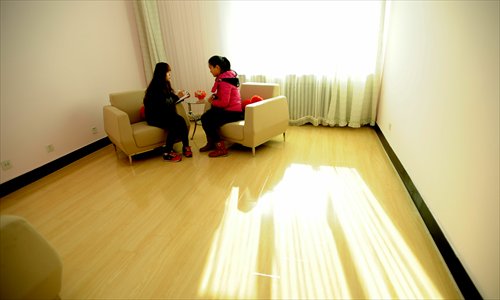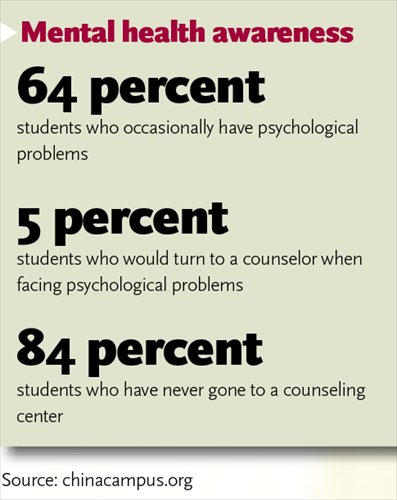Suspected matricide case highlights mental health problems in China’s elite colleges
After Wu Xieyu,a student at Peking University, was revealed to be a suspect in the murder of his mother, speculation has gone wild on social networks. Regardless of Wu's guilt, this incident has drawn attention to the mental health problems faced by Chinese college students.

A student receives counseling at the center for mental health in Shenyang Agricultural University in Shenyang, Northeast China's Liaoning Province. Photo: CFP
A month after local police found Xie Tianqin murdered in her apartment in Fuzhou, East China's Fujian Province, her son Wu Xieyu is all over the news.
Wu Xieyu is now even listed in the online encyclopedia of baidu.com, China's biggest search engine. It describes him as "a student from Peking University (Beida) who is suspected of having killed his mother at their home in Fuzhou."
Police discovered that the killing happened half a year ago in July 2015. After his mother's death, Wu reportedly forged his mother's handwriting on several letters, resigning from her job and borrowing more than 1.4 million yuan ($216,000) from their friends and relatives, saying that Xie was going to the US with Wu.
He then disappeared completely, until on February 5 he sent a message to his uncle, saying that he and his mother were coming back home from Boston. The message eventually made his relatives worry and led the police to the house where his mother was found dead.
Wu is still at large, and police have not released any hints as to where they suspect he might be hiding.
Killing one's own mother is already a crime beyond the pale, but the fact that a student from a top university like Beida is the main suspect made this case all the more shocking to the Chinese public. As Wu has not been questioned over the crime yet, speculation has run wild about the case - both about who is behind the killing and, if Wu was the killer, what could his motivation have been.
Meanwhile this case has once again aroused the discussion over the mental health of college students, as this is not the first case of a student committing heinous crimes. Regarded as elites, top college students are expected to be the last people to commit a crime. But severe criminal cases involving students remind people that they are human too.
Amid the outrage and perplexity, some have seen Wu as a victim too, of the environment he lives in. "Both the education and social environment is responsible for such a tragedy," said Zhao Zhongxin, a professor from Beijing Normal University that specializes in family education.
After all, his actions could destroy the young man's prosperous career and whole life, if he is really the killer. "How depressed must Wu have become, to be so single-minded regardless of his reputation and future!" a netizen posted on zhihu.com, an online forum.

An ignored world
After details of the case emerged, many media reports described the execution of the crime as "meticulous." Some even called it a "talented crime." It has been reported that, before and after his mother's death, the 22-year-old was totally calm.
A since-deleted Weibo post describes Xie's body as being wrapped in dozens of layers of plastic, covered with powdered carbon and pesticide between the layers. And there were several cameras set up in the room that were linked to Wu's phone.
Wu's classmates have found it hard to believe that he could have committed this crime. As the case came to public attention, people who knew Wu began to appear and say their piece. Most of the comments are positive. Wu's friends and classmates remember the boy as excellent academically, friendly and filial to his mother.
Many media outlets have emphasized Wu's academic excellence in their reports. Wu was a top student throughout primary and middle schools and was enrolled by Peking University in 2012 without even taking the gaokao college entrance exam. Pursuing his dream of studying abroad, he got scores in the Graduate Record Examination, a standardized test that is an admissions requirement for most US graduate schools, that put him in the top 5 percent in the world.
But there were hints that behind Wu's halo was an undiscovered, darker world.
For example, he seldom talked about his family or showed his personal feelings in front of friends. In 2013, he once told his best friend that college life was oppressive and he wanted to commit suicide.
It was also reported that Wu fell in love with a sex worker and that their relationship was tumultuous.
"It takes time for a person to take this step… What if someone had noticed Wu's inner struggle, or at least shared some burden for him?" one netizen wondered.
Building a channel
If Wu is the killer, while people can't understand why someone would kill their mother, many are also struggling to understand why someone would throw away such a bright future.
The case has prompted wide discussion, ranging from the morality and mental health of students, to schools' management of their students, to the failings of the education system more broadly - even increasing social pressure is cited as a thing to blame.
Such questions always arise when crimes are linked to top schools, such as the unsolved Zhu Ling case (a student at the elite Tsinghua University who was poisoned in 1994 - many suspect by her roommate) and the case in which a student from Shanghai's top Fudan University was fatally poisoned by his roommate three years ago. College students are regarded as elites, but such cases serve as shocking reminders that even such intellectual elites can have problems that lead to tragic consequences.
Song, a psychological doctor from Qiqihar, Northeast China's Heilongjiang Province argues that such cases should provide a clear sign that many college students, even at elite colleges, are unable to deal with major changes in their lives and require greater support.
"Usually adults have the ability to face what's happening around them and digest it in their own way, but if a person is incomplete in personality, when faced with pressure or difficulties, he will lack the ability to judge and often take radical measures," Song told the Global Times.
As reported by news portal yangtse.com, one third of college students have psychological problems of varying degrees.
Song said that many of her patients are college students who are "under great pressure and troubled with various kinds of problems."
"But there's chance to make up. Even if a person's personality is formed before they are 18, it could still be amended properly when problems emerge, as long as they are discovered in time," noted Song.
Xu Kaiwen, vice director of Peking University's center for mental health, told the Global Times that starting from 2005, almost 90 percent of universities have built their own centers to improve the mental health of college students. "This group is already given much more attention compared to people from other fields," said Xu.
As Xu observes, universities in big cities like Beijing and Shanghai are doing well in this regard and college students are increasingly willing to take the initiative to solve their problems by seeking help from such centers and "the demand is rising."
Stressing that "the counseling center indeed plays a big role in preventing severe problems from happening," Xu also noticed that not every college is equipped with psychology professionals, and they may fail to provide professional guidance to the students.
"We are doing our best to help those who come forward, but it is impossible to cover everyone, particularly those who are unwilling to show up for such assistance. It takes time to reach everyone," said Xu, agreeing that if Wu is really the killer, the tragedy could have been prevented if he had sought mental health help and guidance from the center when he encountered unbearable troubles in life.
A survey on chinacampus.org, a website owned by China Campus magazine, shows that 95 percent of the students who responded to the survey agree that psychological problems should be treated seriously, 64 percent of the students occasionally have psychological problems, but only 5 percent say they would turn to a counselor, and 84 percent said they have never gone to a counseling center.
Tracing the origin
As such mental health centers cannot reach all students, some hope that teachers could help counsel their students. But this is not necessarily realistic.
Ma, a student at a university in Beijing, told the Global Times that generally students cannot rely on teachers to help them with their personal problems. "They only play the role of holding meetings and organizing activities or providing general guidance for school life."
"If you are extraverted enough, you can go ahead and communicate with the teacher. But if you are introverted, most of the time they won't take the initiative to talk to you or pay extra attention," Ma said. "They pay most attention to job-hunting, and care little about students' mental health."
To raise awareness, Song called for making mental examinations mandatory for every student when they enter college, an examination, as the Global Times has found, most universities fail to provide.
But as Xu noticed, it is not enough to pay attention to this problem at college alone. "Compared to pressure, college students are more troubled by a lack of proper values. They feel at loss about the meaning and value of their life, however excellent they are. It is the main reason for their psychological problems and it is caused by failings in primary and middle school," Xu told the Global Times.
The education in primary and middle schools in our country is becoming too utilitarian and school entrance examination-oriented, noted Xu. "It is becoming an industry where speculators make use of parents' anxiety to earn money, opening all kinds of classes. All the burdens will fall on the student eventually," he said, adding that many students begin to have mental problems before entering college. "It is a matter of accumulation."
"Schools generally put intelligence in front of morality and personality in education, caring only about the enrollment rate, which is also the main index education authorities and society use to evaluate a school," Zhao told the Global Times.
"And family education in particular is going in a wrong direction. Parents only stress their children's test scores and studies, and pay too little attention to what kind of people they will become in the future," Zhao said.
But not everyone regards the case as one that holds universal meaning, arguing that it is an individual and special case. Ren Fang, president of Xijing University once told youth.cn that "it is not proper to exaggerate the case in case it has negative effects on children that only have slight psychological problems."
Newspaper headline: Ivory tower crimes